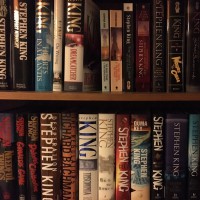This novel is a somewhat unusual for King in being written in the present tense (third person limited). Writing about atypical people is pretty typical of King, though. From the very first paragraph, the titular character is introduced as an intuitively intellectual, well-read man who pretends to prefer comic books. He’s also a former soldier, nowadays gun for hire. One with principles, insisting on being informed before accepting a job:
“Is it a bad person?”
Aiming to retire, he’s offered the classic Last Job, this one featuring a man in his own line of work but without the principles. Typical of King is also the ability to provide exposition in the form of a long dialogue, but making it feel like vivid storytelling. No exception here. The catch, if catch it be, is that he will have to spend some time in a small southern community until the job is due. Sounds almost like an inverted 11.22.63, right?
Everything has been prepared for him including a cover story where he is supposed to be working on a book. Can he actually write one, perhaps even his life story, on a probably bugged computer, in a way that doesn’t reveal him as a thinking man? As well as socialise with neighbours and new acquaintances, and the woman from the accounting firm in the same office building, without getting too close, for months? And maintain an additional fake identity in a plan hidden even from his employer? That’s the plan anyway. Oh, and can he trust his employer?
”Writing is good. He’s always wanted to do it and now he is. That’s good. Only who knew it hurts so much?”
Billy may be playing his ‘dumb self’ but King offers tidbits of learning to the reader in the form of what Billy only thinks. Billy may also act humourless but King has fun describing people and settings, as always. It’s entertaining right out of the gate.
Firmly placed in our times with the occasional Trump diss and references to Netflix shows (Ozark!), it has that King sense of realness one has come to expect. Unsurprisingly, sections of the book Billy is writing is also included, initially in childishly but engagingly written sentences, short on commas but long on tragedy. Does the story matter, he asks himself, even if no one reads it? Yes, he decides.
“Because it’s mine.”
The event which could be the finale of a different book happens before the halfway mark, and it’s suitably pulse-raising. After this, though, there’s plenty more story to tell. Because, as he’s started to suspect long ago, Billy himself might be a loose end. Also, he hasn’t finished his book.
King being King, he is often very straightforward in his writing. The story is the main thing, right. But he’s also the King that will write:
“There’s a certain breed of fast-dealing small-city sharpie who believes that no matter how deep the shit is, someone will always throw him a rope. These are the broad-smiling firm-handshaking hustlers in Izod polos and Bally loafers who could have come with self-involved optimist stamped on their birth certificates.”
A period of waiting leaves time for more looking back, on Billy’s time in Iraq for instance. Here the chapters get longer, and the ‘dumb self’ is no longer writing them. As is often the case, King seems to have studied up on a topic (or several) that he can’t possibly have personal experience of well enough to write about it credibly. In this case, it’s the subjects of sniping and the Iraq war that are portrayed with a level of detail that can hardly be guesswork. The jargon, the fatalism. The details you rarely hear about but which sound true when you do.
But in the present, his fundamental decentness soon lands him in the ‘mother of all messes’. Trying to be a little better than he strictly has to be, while still acknowledging the alternative, complicates his situation considerably. And potentially starts a friendship. Which is exactly the mistake he made with his recent neighbours. Still, you hope for him. Billy really is a good-ish guy. And a killer. He is “stuck with himself and must make the best of it.”
Suddenly he is responsible for another human being. Panic attacks and pandemic foreshadowing. And someone to read his book.
“He wants to thank her for crying, but that would be weird.”
But there are also scores to settle. And mysteries to unravel. The ‘why’ of it is in some ways what I expected, but more complex.
Some two thirds in, Billy Summers is a perfect book. But so was The Institute at that point, and the ending didn’t really live up to the setup. Will it be different here? Yes. Actually. Without failing to reference the type of action movies that this narrative is reminiscent of, but steering clear of their cliches but not foregoing the excitement, King gets everything right. It’s expertly written but Kingly honest. It’s all story but no bs. It’s a modern tale of a chivalrous knight. And very aware of itself.
“Every character in a story must be used at least twice.”
When, near the end, Billy’s book about his past becomes the story of the present, switching from third person present tense into first person past tense, it feels entirely natural. And after that, there is still one more bold literary move left. A perfect one.
And the ending is not only good, it’s one of King’s finest.
